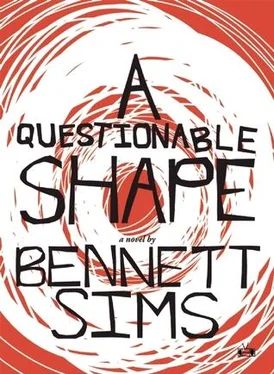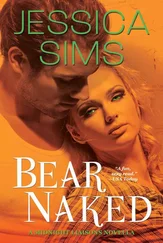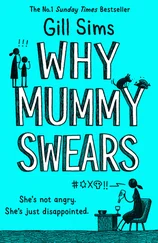44
I’ll bet Joyce could write a good short story about this titled ‘The Undead,’ in which an oblivious and self-satisfied husband goes in search of his reanimated wife, visiting all the landmarks of their courtship in Dublin… only to suffer a rude surprise when he finds her ghoulish body back in Galway, standing on the street where decades ago a young suitor, Michael Furey, had serenaded her.
45
The way that a crashed Word document will restore, not the state of its data the moment it crashed, but the state of its data from whenever it last auto-recovered, a minute or an hour or a day ago. The reanimated Rachel would then be like a first-draft Rachel, auto-recovered from way back, preserving none of the sentences leading up to the crash. All the words I’ve left in her would be lost.
46
Suddenly it occurs to me— I’m certain of it —that Matt planted the other traces as well. If he’s willing to shatter these windows, then why not the rear door’s fanlight? And why not hike into Highland Road Park last weekend, leaving a scrap of plaid for us to find? But then — just as suddenly and certainly — I reject the idea.
47
Taken to its limit — I have often reflected — this kind of muscle memory would persist even in Frankenstein’s monster, whose undead body comprises not just one memory system, but dozens. After all, Dr. Frankenstein quilted the monster together from the segments of various corpses, and there is no reason to believe that these disembodied appendages (sewn onto the monster and there reanimated) would behave any differently from our own undead. The muscle memory of his right hand, harvested from one German peasant (a carpenter), would differ from the muscle memory of his left one, harvested from another (a farmer): whereas the one hand might reach for a hammer, the other might reach for a pitchfork. As with the undead, this equipmental knowledge would remain unconscious for the monster, who literally ‘lets not his right hand know what his left hand doeth.’ In this way, the borders of his know-how would be strictly delineated by stitchwork, making his body a map of gerrymandered memories: the left hand would be zoned off, county of the know-how of baling hay; and the right hand zoned off, county of the know-how of swinging the hammer; the right foot zoned off, county of the know-how of punting; and so on.
48
Here my model is Martin Heidegger, a philosopher who located both epistemology and ontology in the hands. In his account, the know-how of a hand handling its equipment, the ‘ready-to-hand’ knowledge of a hand, is the most immediate way that man (what Heidegger calls ‘Dasein,’ literally ‘Being There’) has of understanding objects. The more that a hand uses a hammer, the more that it unveils the true ‘hammer-being’ of the hammer. And granting that this epistemology of the hand doubles as an ontology of the hand — that is, an account of how hands go about being in the world or otherwise constituting the Being of that world — such ready-to-hand knowledge is naturally fraught with existential significance. Whenever Dasein uses the hammer, he relates not just to the hammer but to everything: the nails in his desk drawer, the desk, the chair at the desk, the room itself, with its walls and windows and doors, the hallway outside and the house, continually spiraling outward, ad infinitum, until the hammer has formed a total world. Being-in-the-world means being caught up in just such a network of equipmental relations, which Dasein is enmeshed in anytime he grabs a tool. For Heidegger, to hold something is both to know and to be. In the case of our undead, the ramifications of this chiral ontology are clear. If an infected breaks into its old bedroom, and its hand roots under the bed for the hammer that it ‘knows’ is there, then doesn’t the infected also ‘know’ the equipmental totality of the mattress, bed, room, and house, that is, the entire Being-in-the-World of its quondam Dasein, which is to say, couldn’t the infected be, in some qualified way, precisely the same Dasein? And in the case of Frankenstein’s monster, these ontological ramifications multiply mind-bogglingly across all of his limbs. Because each hand wants to root for a different tool from a different life, and because each foot wants to walk toward a different home — because the monster has to coordinate all of his limbs independently, just to stumble forward and turn a doorknob — it’s as if his entire body were a gangline of Daseins, pulling the musher of his madman’s brain.
49
Here my model is, not Heidegger, but Viktor Shklovsky, the Russian critic who writes about habituated memory in his essay ‘Art as Device.’ He refers to the phenomenon as ‘automatized perception.’ Humans can perform one task so often, he writes, so unconsciously, that we gradually cease to see what we’re doing: ‘The object fades away… We know it’s there but we do not see it.’ Shklovsky compares this state of unawareness to death, and quotes from the diaries of Leo Tolstoy, who reports having been habit-blinded one afternoon while dusting his room: when he came to his sofa, Tolstoy writes, he couldn’t remember (‘for the life’ of him) whether he had already dusted it or not, so unconsciously had he been sleepwalking throughout the space. It was exactly like being dead. After quoting this passage, Shklovsky delivers his famous motto, which does not fail to raise the hackles on my arms whenever I remember it now: ‘[L]ife fades into nothingness,’ he writes. ‘Automatization eats away at things, at clothes, at furniture, at our wives.’ For yes, that is exactly how it is with our undead: they do not see us, but they know we’re here. They push their shopping carts, pick up dusters, eat our wives.
50
Matt is actually quite insistent on this point. I learned this for myself one morning several weeks ago, when we drove past a field and I made the mistake of referring to the stray infected there (five distant silhouettes, standing perfectly still in the morning fog, pale and spectral in what must have been white nightgowns) as ‘ghostly.’ ‘No,’ Matt corrected me, with a vehemence I found surprising, ‘they’re not like ghosts at all.’ He spent the rest of the morning in lecture mode, elucidating all of the irreducible differences between the undead and specters. For one thing, he said, you would never see ghosts just standing out in a field like that, beneath a bare sky in broad daylight. They are fundamentally interior creatures. Once a spirit returns to haunt a house, there’s this sense in which it’s bound to the premises, almost by a spatial loyalty, a sedentary fidelity to place. It’s the undead who are free (or rather, compelled) to roam about. That’s the difference. You can tell the infected apart from ghosts not by the corporeality of one, or the insubstantiality of the other, but by their relation to space, he claimed. At the time, Matt’s spatial distinction reminded me strongly of Mr. Mazoch. For his life, too, had had two distinct relations to space: before his heart attack, he had been a veritable man about town, driving from job to job and moving from house to house; whereas afterward, he mostly stayed inside, becoming an eremite in retirement, the final years of which he spent (by Matt’s account) with the agoraphobic unimaginativeness of a ghost. Ever since then I’ve wondered whether this is the true subtext of Matt’s ghost/ghoul dichotomy, the reason he was so vehement about maintaining it: that if the undead aren’t ghosts, then neither is his father. In undeath, Mr. Mazoch can be the opposite of a ghost, and, to the degree that he had led a ghostly life, he can be the opposite of himself. Freed from the physical restraints that had anchored him so long in Denham, Mr. Mazoch (or his body) would be at liberty to wander wherever it wanted, shuffling for indefatigable miles all over Baton Rouge. Quickened, at last, after five years of ghostlike motionlessness. (According to this view of things, Mr. Mazoch must have just split the difference when he died: he must have divided up his kingdom of infinite space, with his undead corpse taking the outside [banished to Mr. Mazoch’s mortal paths], and his ghost taking the inside [unable to exit its house in Denham, where even now it might be trapped, pacing translucently from room to room]. This is assuming, of course, that Mr. Mazoch would get both, both a reanimated corpse and a ghost. You’d have to say that he was cleaved in twain, leaving both a spiritual remainder and a bodily remainder, and that these opposite supernatural energies, diverging from his death, went haunting in different directions: the one inside, the other out. It makes rigorous, dualist sense. [I can’t help wondering, though, what would happen if the undead corpse and the specter of Mr. Mazoch ever met each other. I imagine the mutual shock, the dropped monocles: ‘My good sir, I am Mr. Mazoch.’ ‘But I’m afraid that’s quite impossible — for you see, I am Mr. Mazoch.’])
Читать дальше












